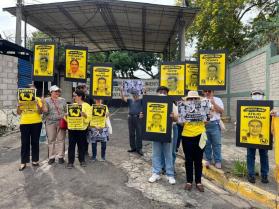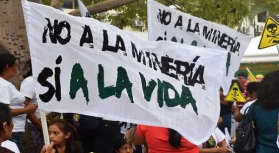Thousands March Against Water Privatization
On Thursday, August 22, thousands of community, environmental, youth and labor organizations filled the streets of San Salvador to demand the passage of a Water Law that would guarantee all Salvadorans' right to water and prevent any forms of privatization of the essential resource. A draft of the legislation currently sits before the National Legislative Assembly, where right-wing parties have stalled its passage in hopes of including mechanisms for privatization and concession of public water administration. The rally was organized by the Water Forum, a coalition that boasts a vast and diverse social movement membership, all out in force on Thursday. Community water committees, public water utility unions, organizations from the National Roundtable Against Metallic Mining, student groups from the National University, and a variety of non-profits blocked traffic on major city thoroughfares, chanting “Water is a right! Not merchandise!” The massive march began at the Salvador del Mundo monument and wound its way to the Legislative Assembly, detouring past the headquarters of the right-wing Nationalist Republican Alliance (ARENA) party, where protesters stopped to chant, “They’re the ones! They’re the ones! The ones that sell out the nation!” The social movement has drafted two versions of the proposed Water Law together with legislators from the leftist Farabundo Martí National Liberation Front (FMLN) party since 2006, neither of which has achieved the support necessary to pass. The bill’s current version was presented by the Ministry of the Environment, and faces a coordinated assault: As the right-wing pushes to include privatizing mechanisms in the Ministry of the Environment’s legislation, those same forces are lobbying to reform the US-backed Public-Private Partnership (P3) Law to include water administration among the public industries open for private contracts. Both the Salvadoran private sector and the US government have stakes in staving off anti-privatization legislation, as some 50 water projects have been proposed as part of the second Millennium Challenge Corporation development aid fund (MCC) to be contracted out to private corporations—the very same funds that US Ambassador Aponte ransomed for the passage of the P3 Law in the first place.
In the face of these threats, legislation ensuring public administration of the precious resource is more important than ever. “We need a law that promotes the human right to water, and above all, that avoids the privatization of this vital liquid, so that [the right-wing business association] ANEP or the transnationals don’t steal our water,” said Ángel Ibarra of the ecological non-profit Salvadoran Ecological Unity (UNES), “Water must remain a public good.”

 "I am a CISPES supporter because continuing to fight for social justice and a more people-centered country means continuing the dream and sacrifice of thousands of my fellow Salvadorans who died for that vision.” - Padre Carlos, New York City
"I am a CISPES supporter because continuing to fight for social justice and a more people-centered country means continuing the dream and sacrifice of thousands of my fellow Salvadorans who died for that vision.” - Padre Carlos, New York City

